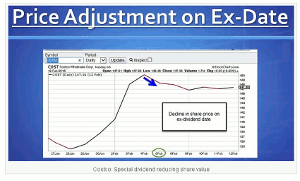Options expert Alan Ellman, of TheBlueCollarInvestor.com, defines the two types of dividends—standard and special—outlines how they impact option premiums, and illustrates the impact of special dividends on share value and strike prices.
Dividends impact option premiums. When a dividend is distributed, the cash holdings of a corporation is decreased, and therefore, the company and its stock are worthless. The eligibility to receive the dividend depends on several factors, including the size of the dividend.
First, let’s define some terms:
Types of Dividends
- Standard dividends: A distribution of a portion of a company’s earnings, which can be issued as cash or shares of stock. Most dividends are distributed on a quarterly basis
- Special dividends: A one-time distribution of corporate earnings usually in the form of cash due to an exceptional amount of profit in a given time frame
Ex-dividend Date Standard Rules
To capture a dividend, a shareholder must buy the shares prior to the ex-dividend date (aka the ex-date). Under normal circumstances, the ex-date is two days prior to the record date, which is the official date that the stock owner is, in fact, a shareholder of that company. Since it takes three days to settle a stock purchase, shares must be purchased three days before the record date. After that, two days before the record date, the stock goes ex-dividend and shares purchased from that point forward are no longer eligible to receive the dividend. The actual payment date is sometime after the record date. These standard rules apply to standard dividends and special one-time cash dividends, which distribute less than 25% of the value of one share.
Ex-dividend Date Special Rules
When the special cash dividend distribution is an amount greater than 25% of the value of one share, the ex-date is set the day after the payment date. Therefore, if a stock is purchased after the record date but before the ex-date, the dividend is still captured. The ex-date always determines who receives the dividend, the stock buyer or seller.
Impact of Special Dividends on Share Value and Strike Prices: COSTCO example
In February, 2015 Costco (COST) distributed a special one-time cash dividend of $5.00 per share. Since this amount was less than 25% of share value, standard ex-dividend date rules applied. The record date was February 9 (after a weekend) and the ex-date was February 5. Option strike prices were reduced by $5.00 per share on the ex-date and share value also declined because of this distribution as shown in the chart below:
Summary
There are two types of dividends, standard and special one-time cash dividends. Special ex-dividend date rules apply when special dividends are greater than 25% of share value and it is always the ex-date that determines who receives the dividend. For option sellers, share value and strike prices will decline by the dividend amount on the ex-date.
By Alan Ellman of TheBlueCollarInvestor.com











